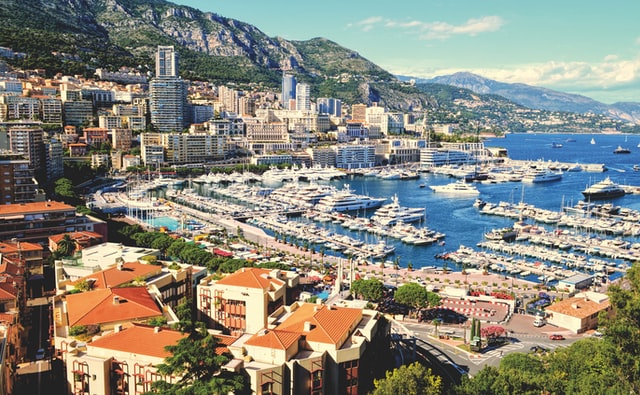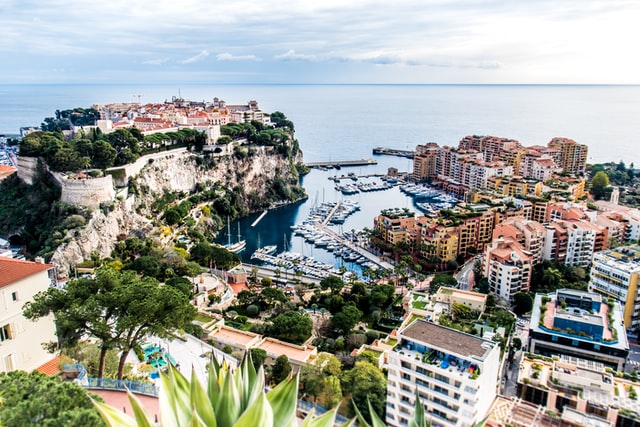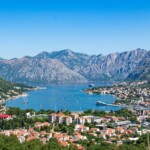On the French Riviera stands Monaco, a sovereign city-state loved for its excellent weather, luxury lifestyle, and delicious cuisine. But that’s just one part of the picture: with its favorable business environment, optimal financial services, and profitable tax regime, Monaco is attracting high-profile expats from all over the world. Indeed, becoming a Monaco resident has a host of benefits. Monaco residence by investment has become an excellent option to gain residency providing you with all the benefits that the city-state has to offer.
If you are also interested in acquiring Monaco residency, this guide is for you. You will receive detailed information on:
- An introduction to Monaco
- Why Monaco?
- Residency by investment in Monaco
- Benefits of Monaco residency
- Tax benefits
- Process to obtain residence in Monaco
- Residency requirements
- Step-by-step guide
- Timeline
- How to obtain Monaco citizenship
- Practical information about Monaco
An introduction to Monaco
Monaco, nestled in the south-eastern corner of France, is the second smallest country in the world. The city-state provides very good tax benefits for expats, an incredible climate, and is perfect if you are looking to live a truly luxurious and glamorous lifestyle.
Monaco accounts for 2% of the world’s luxury real estate, which is a pretty incredible feat when you consider the small size of the country. Many expats choose to live in Monaco and purchase a property, with there being many magnificent luxury options that attract investors from the world over. The extravagant homes make Monaco a wonderful place to live.
While Monaco boasts luxury, the city-state is also one of the safest countries in the world. With low crime rates and a police force that is well-known for its efficiency, if you are looking to live in Monaco, be rest assured that you are in safe hands.
On top of this, Monaco has a typical Mediterranean climate, sunny and warm — an additional reason why living in Monaco, if you have the finances in order, is an excellent idea.
Why Monaco?
As the result of its excellent investment facilities, economic and political stability, and that supply outweighs demand in terms of real estate investments, there are many reasons why Monaco is an ideal investment location. Investors that want to place their money in luxury real estate have the world at their fingertips when it comes to Monaco.
Outside the investment sphere, the quality of life is also excellent. With a strong focus on sustainable development and environmental performance, and very good freedom and happiness levels, it is a very good place to live. Indeed, several of the rich and famous have property in Monaco, where they can enjoy a luxurious lifestyle.
Monaco residency by investment
Immigration investment is possible in Monaco. The investment requirements for a Monaco residency permit are:
- To purchase a property or rent a property in Monaco
- To deposit and maintain at least EUR 500,000 into a bank that is duly registered in Monaco and in an account that is under the applicant’s name. This will need to be held with the bank during all times of the residency period.
How can I get Monaco residency?
As per the Monaco residency rules, If you want to establish Monaco as your second residence and stay more than three months, you will need to apply for a Monaco residence card. You are able to become a resident in Monaco if you are:
- Self-employed, or the manager, director or holder of a company in Monaco
- Setting up a business in Monaco
- Employed in Monaco
- Retired
- Have self-sufficient funds
- Being supported by someone
In addition to providing documents that prove your status, you’ll also have to show proof of accommodation in Monaco, evidence of self-sufficient funds, and proof of good character. Non-EU citizens have to bear in mind that it takes around four to six months to acquire an EU residence permit in Monaco.
Note that in order to maintain the validity of the residence card, you will need to reside in Monaco for at least 183 days per year. This is the Monaco residency minimum stay.
Benefits of Monaco residency
Tax benefits
One of the main benefits of becoming a Monaco resident is to enjoy the country’s favorable tax system. Indeed, many foreigners acquire tax residency in Monaco due to its zero-income tax policy. Monaco residents (unless they are French citizens) are not subject to personal income tax, investment income, capital gains tax, dividends, or directors’ fees.
Moreover, there is no wealth tax, no local tax, and no property tax in Monaco. In addition, direct family members are not subject to gift, or inheritance tax.
Finally, only firms carrying out commercial or industrial activities and generating more than 25 % of their turnover outside Monaco are subject to corporate tax.
Monaco residency process
In order to obtain Monaco residency, you will have to go through different stages. Note that EU nationals won’t have to apply for a long-stay visa.
Apply for a long-stay visa
If you are a non-EEA citizen, you will need to start your residency process by applying for a long-stay visa through the French Consulate or Embassy of your country of permanent residency, or if already in Monaco to the French Embassy. Non-EU nationals who have been living in France for already a year will only need to apply for a transfer of residency from the French Embassy in Monaco.
Apply for Monaco residence permits
Once your long-stay visa has been granted, you will need to apply for Monaco residency by gathering the required documentation listed below and by attending an interview with the Residents Section of the Monaco government. Once you have attended your official residency interview, your application will then be processed by government officials, and you can expect to receive your residency permit in sixteen to twenty weeks.
Here are the different resident permits you are expected to receive:
- The Carte de sejour temporaire is the first temporary residency permit that you will receive. It is valid for a year but then Monaco residency renewal is viable for three consecutive years
- The Carte de sejour ordinaire is a permanent residence permit that you will receive after your carte de sejour temporaire. It is valid for a three-year period and renewable for another three-year period as many times as you like.
Residency requirements for Monaco Residency
To become a Monaco resident you’ll need to:
Show evidence of rent or purchased accommodation:
- If you or your company owns property: a notarised property deed
- If you have a rental: a tenancy agreement registered with the Department of Tax Services
Show evidence of sufficient financial resources:
- If you are employed: an employment contract providing evidence of your salary or work permit
- If you are self-employed or the manager or director of a Monaco company: proof of professional income
- Evidence that you are supported by a spouse or a partner
- If you are a self-sufficient applicant: a bank letter confirming that you have sufficient funds to live, that is placed in a bank account to reside in Monaco (this should come from a Monaco bank)
Required documentation
Along with the documentation mentioned above, you’ll also need to provide:
- A valid passport (including a long-stay visa if applicable)
- A birth certificate
- Health insurance
- An extract from the criminal record or the equivalent (Certificato penale, criminal records, etc.) issued by the authorities of the two last countries in which you have resided in the past five years, before your arrival in Monaco
- Marriage certificate (if applicable)
- For children: A passport or identity card for each child; proof of custody of minors (if applicable); proof of adoption (if applicable); proof of schooling for children educated outside Monaco
Step-by-step guide to Monaco residency
1. Apply for a long-stay visa
2. Gather documentation for the permit
3. Make an appointment
4. Attend your interview
5. Receive your temporary residence permit
6. Renew your temporary residence
7. Receive your permanent residency permit
1. Apply for a long-stay visa at the French Embassy or French Consulate of your country of residence.
2. Gather all the required documentation for the Monaco permit
3. Make an appointment with the Residency, Certifications and Lost-and-Found Section
4. Attend your interview with the Monaco authorities
5. Receive your temporary residence permit for one year
6. Renew your temporary residence permit for three years
7. Receive your permanent residency permit
Application timeline
Month 1
(For non-EU citizens) Apply for a long-stay visa
Month 2
Apply for the Monaco permit
Month 6 - 7
Receive your Monaco temporary permit
Year 1
Renew your temporary permit annually for three years
Year 4
Apply and receive your Monaco permanent residency


Acquire Monaco citizenship
Once you have lived for more than ten consecutive years in Monaco, you are able to apply for Monaco citizenship by naturalization.
However, it is important to keep in mind that Monaco does not allow dual citizenship. You will have to renounce your current citizenship if you’d like to have a Monaco passport.
Practical information about Monaco
In this section, we’ll provide you with some crucial practical information about Monaco, such as living in Monaco, its healthcare system, education system, and climate.
Lifestyle in Monaco
With an exceptional climate, excellent scenery, and a luxurious lifestyle on offer, Monaco is a very special place to live. Luxury hotels, designer shops, the yearly Formula 1 Grand Prix, and its Mediterranean location on the French Riviera leave much to be desired.
Neighborhoods in Monaco
Monaco is divided into ten residential or resort districts that are referred to as “wards”.
The traditional wards are the following:
- Monaco-Ville, seated on a rocky foreland called the “Rock of Monaco”.
- Monte-Carlo, the principal residential and resort ward, is home to the remains of an ancient fortress, a palace, and the world-famous casino.
- La Condamine, in the southwestern section where the port area Port Hercules is located.
- Fontvielle, in the newest ward of the traditional wards that was created in the 1970s.
The six newer wards are the following:
- Moneghetti, created from part of La Condamine where Jardim Exotic can be enjoyed.
- Larvotto, created from part of Monte Carlo.
- La Rousse/Saint Roman, created from part of Monte Carlo.
- Saint Michel, created from part of Monte Carlo.
- La Colle and Les Revois, both created from La Condamine.
Which neighborhood in Monaco is for me?
Where you will live will depend greatly on what you are looking for. Beach-lovers will find Larvotto the best place to be, as it is positioned right on Larvotto Beach, with beautiful ocean views. Monte Carlo is best known for its luxury and designer shops, whereas Monaca-Ville, the oldest district in Monaco, is where the famous Prince’s Palace and Cathedral of Our Lady Immaculate can be found.
For families, La Condamine is a favorite, where you have the excellent farmers market to get your hands on the freshest produce. Fontvieille is located in the very south of the city-state where you will see all the luxury yachts in Fontvieille Porto and the Stade Louis II, amongst other sporting arenas.
The Mongehetti district is where you will see the skyscrapers and condos, and the only railway station in Monaco is located in this part of the city, where you can take the train to France or Itlay.
Saint Michel, La Colle, Les Revoirs, and Moneghetti each have more affordable properties. However, note that prices anywhere in Monaco are very high compared to other places in the world.
Healthcare in Monaco
According to the Organisation for Economic Co-operation and Development (OECD), Monaco has one of the best healthcare systems in the world and has the third-highest doctor-to-patient ratio in Europe.
The official agency that is responsible for overseeing Monaco’s public health service is the Caisses Sociales de Monaco. For citizens and long-term residents of Monaco, who contribute to the agency, public healthcare is automatically covered.
French and Italian citizens can also access the public healthcare facilities in Monaco, as long as they can provide proof of regular contributions to their respective country’s state healthcare system.
Foreign visitors are able to receive health treatment at all public hospitals and clinics. However, without state insurance contributions, travelers and expats will need to pay for healthcare expenses from the treatment.
Education in Monaco
The education course syllabus is identical to France’s. Education consists of four public schools and two secondary schools. Every child between the ages of six and 16 is required to attend, where students receive a high-quality education that has a special focus on sports, language, and individual options based on each student’s needs and aptitudes.
After secondary school, students have the option to attend one of two higher education schools in Monaco. The two options are the Lycée Albert 1er, which focuses on secretarial studies and accounting, and the Lycée Technique et Hôtelier, where the focus is on hospitality, business, and specialized education.
It is important to note that the focus of education in Monaco is closely linked to France’s education system. The schools in Monaco are under contract and approved as French educational establishments, which follow the timetables, teaching programs, and tests that are approved by the French national educational authority.
Transport in Monaco
There are buses, bicycles, electric taxis, public lifts, moving walkways — indeed, there are several ways to get around in Monaco. However, as it takes less than an hour walking to get from one side of Monaco to the other, walking is perhaps the best way to explore the city.
The closest airport to Monaco is Nice, 30 kilometers away, and is easy to fly to There are plenty of taxis at the airport for your onward trip to the city-state and it is approximately a 30-minute journey. There are also airport shuttles and buses that could be an option if you are flying into Nice.
If you are coming from Paris, there is a direct train via France’s SNCF train network which takes approximately 6 hours and 45 minutes. Coming from Itlay, the Trenitalia train service connects Monaco to Milan, Genoa, Rome, and Venice. Connections are usually made in Ventimiglia, which is the first train station after the French-Italian border. If you happen to be coming from Russia, Russian Railways provide a weekly service that runs from Moscow down to Nice, and takes approximately 47 hours, stopping in Minsk, Warsaw, Vienna, and Verona en route.
Climate in Monaco
Monaco has a Mediterranean climate, so expect hot summers and winters that are mostly mild, although they can get a little cold. Monaco experiences over 300 days of sunshine per year. The average temperature in July being 82°F (29°C) and the average temperature in January is 55°F (13°C).
Global Passport Index
Global Citizen Solutions have developed a pioneering Global Passport Index, that looks beyond simple mobility and how many countries you have visa-free access with a passport. We believe that the true value of a passport is also reflected in the investment opportunities that a country can offer, in addition to the quality of life factors, such as sustainable development, freedom of speech, and cost of living.
Monaco performed strongly in the Global Passport Index, ranking in 17th position in the Global Passport Index.
This was mostly due to its excellent investment opportunities, ranking in 6th position in the Investment Index. Individuals in Monaco can expect excellent investment and business opportunities.
An overview of our methodology can be found here.
The country page for Monaco can be found here.
Frequently Asked Questions
How can I get Monaco residency?
In order to obtain Monaco residency, you’ll need to show evidence of accommodation in Monaco, proof of sufficient savings to live in Monaco, and proof of good character.
How long does the Monaco residency procedure take?
If you are a non-EEA national, government procedures will take between four to six months for you to receive your residency permit.
What are Monaco residency benefits?
Monaco residency benefits are multiple, but becoming a tax resident is one of the biggest advantages. Residents (unless they are French citizens) are not subject to investment income, capital gains, dividends, or directors’ fees. Moreover, there is no wealth tax, property tax, or local tax in Monaco. In addition, direct family members are not subject to gift, or inheritance tax.
Can I purchase Monaco real estate?
You do not need to own real estate if you wish to become a resident in Monaco. It is enough to be renting a property. However, if you wish to acquire a house or apartment in Monaco, this could be a very good investment. Monaco has a stable real estate market, which makes it very advantageous to be owning real estate. Whether you are looking to rent or purchase property, there are excellent options open to you.
Can I get Monaco citizenship?
If you have been a Monaco resident for ten consecutive years, you are able to apply for Monaco citizenship by naturalization. The Monaco passport gives you the ability to have Monaco citizenship for life along with visa-free travel to over 160 countries worldwide. Bear in mind that Monaco does not accept dual citizenship, so you’ll have to renounce your current citizenship in order to become a Monaco citizen.
Is Monaco safe?
Monaco is one of the safest countries in the world.
What are Europe’s alternative residency programs?
If you’re interested in acquiring European residency, have a look at the Portugal Golden Visa and the Spain Golden Visa. These residency programs also give you the opportunity to become EU passport holders without having to renounce your current citizenship.
How to apply for Monaco residency?
To stay more than three months in Monaco and apply for Monaco residency, you will need to obtain a Monaco residency card. You can become a resident in Monaco if you are self-employed, or are the manager, director or holder of a company in Monaco, have a work permit, are setting up a business in Monaco, employed in Monaco, retired, have sufficient self-funds, or are being supported by someone.
You will need to provide documentation that proves your status, show proof of accommodation in Monaco, evidence of funds, and proof of good character. Non-EU citizens will need to bear in mind that the duration of time it takes to acquire Monaco residency takes four to six weeks.
To apply for Monaco residency and obtain Monaco residency, you will need to go through different stages. Note that if you are a EU national, then you will not have to apply for a long-stay visa.
Non-EEA citizens will need to apply for a long-stay visa through the French Consulate or Embassy of your country of permanent residence, or if you are already in Monaco, to the French Embassy. If you are a non-EU national that has been living in France, you will simply need to apply to transfer your residency from the French Embassy in Monaco.
Once you have a long-stay visa (not applicable for EU citizens) you will apply for Monaco residency by gathering the necessary documents and attending an interview with the Monaco governments’ Residents Section. Following this, your application will be processed and you can expect to receive your residency permit in 16-20 weeks.
The different permits that you can expect to receive are 1. The Carte de sejour temporaire (temporary residence permit valid for one year and renewable for three consecutive years) and 2. The Carte de Sejour ordinaire (permanent residence that you will receive after your carte de sejour temporaire, valid for three years and then renewable for another three-year period thereafter).
Is it hard to become a resident of Monaco?
It is relatively easy to become a resident of Monaco. The primary way to attain residency status is to be able to show that you have sufficient wealth. Investment immigration is possible in the city-state.
How much money do you need to be a resident in Monaco?
The minimum amount of money to apply to be a resident in Monaco is EUR 500,000. This will need to be held by a bank that is duly registered in Monaco in the applicant’s name. The full amount of money must be held by the bank during all times of the residency period.
How long do you have to live in Monaco to be a resident?
Non-EU citizens will need to bear in mind that the duration of time it takes to acquire Monaco residency takes four to six weeks. For EU citizens this will be shorter, as you will not have to apply for a long-stay visa beforehand.
Does Monaco have free healthcare?
The Caisses Sociales de Monaco (CSM) is the official agency that oversees Monaco’s public health service. Public healthcare automatically covers all citizens and long-term residents that contribute to the agency. If you are a French or Italian citizen you are entitled to public health facilities in Monaco as long as you provide evidence of regular contributions to your home country’s state healthcare system. For visitors, you can also receive health treatment at all public hospitals and clinics. However, if you do not have state insurance contributions then you will need to take care of the healthcare expenses from the treatment.
What is the education system in Monaco?
The education course syllabus is the same as France’s education system. There are four public schools and two secondary schools. Every child between the ages of six and 16 is required to attend, where students receive a high-quality education.
After secondary school, students have the option to attend one of two higher education schools in Monaco. There are two options: the Lycée Albert 1er, which focuses on secretarial studies and accounting, and the Lycée Technique et Hôtelier, where the focus is on hospitality, business, and specialized education.
Education in Monaco is closely linked to France’s education system. The schools in Monaco are under contract and approved as French educational establishments, which follow the timetables, teaching programs, and tests that are approved by the French national educational authority.



